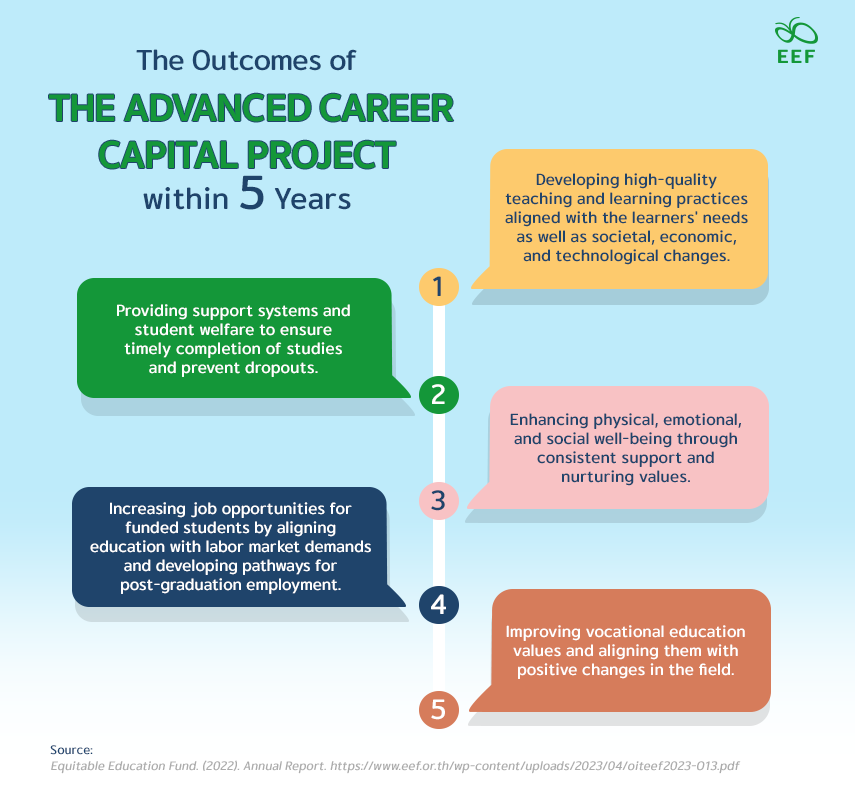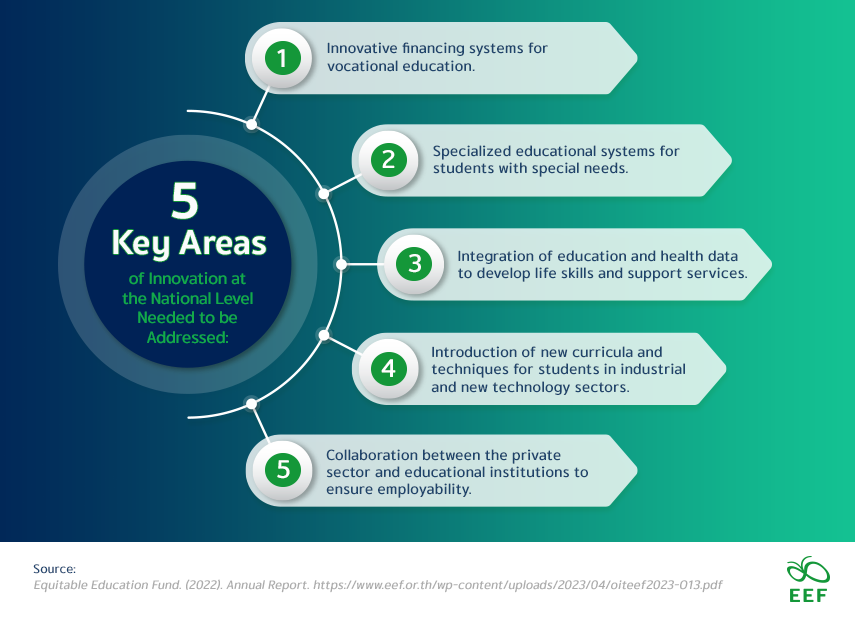
High Vocational Innovation Scholarship Program was introduced by the Equitable Education Fund (EEF) Thailand in 2022 to assist underprivileged youth facing limited prospects. The program targets 15-17-year-old students who have completed secondary education, vocational certification, or equivalent education. Its primary goal is to provide financial assistance for vocational education and employment opportunities upon graduation. The program offers innovative grants in high-demand occupational fields, coordinated by the EEF, in partnership with public and private vocational education institutions, community colleges, and universities, and affiliated organizations.
At its heart, this program seeks to create educational opportunities and develop exemplary vocational schools. It aims to enhance the quality of teaching, learning, and school management, promoting systemic development, preventing student dropout, and encouraging collaboration among various stakeholders. The program also enhances employment prospects for beneficiaries through employer involvement in education management and work-integrated learning.

The program offers scholarships for high vocational certificates and associate degrees, available in 3 types:
- Type 1 (5-year) for Grade 9 students to pursue high vocational certificates/associate degrees
- Type 2 (2-year) for Grade 12 or vocational third-year students to pursue high vocational certificates/associate degrees
- Type 3 (1-year) for Grade 12, vocational third-year students, or their equivalents to pursue assistant nurse or assistant medical technician certifications.
The initiative addresses resource limitations, enabling students to transition to higher education while supporting the development of vocational personnel. By proposing various projects to relevant agencies, the EEF aims to foster organizational development and contribute to the long-term reduction of poverty and social mobility. Through the project, the EEF provides educational opportunities and vocational schools to underprivileged students, ultimately improving their quality of life and employment prospects.
In collaboration with ministries, the EEF has brought about a transformative revolution in vocational education, empowering underprivileged children with excellent academic achievements and immediate employment prospects. Through comprehensive changes in education management, including career guidance, curriculum development, and teaching methodologies, it ensures the successful completion of studies and employment opportunities. This initiative aligns with Thailand 4.0 by driving systemic changes and cultivating a high-caliber workforce.

Underprivileged students in vocational fields receive scholarships to pursue higher education in sectors crucial for national development. These sectors encompass potential industries (First S-curve), future industries (New S-curve), skill shortage areas, as well as STEM and digital technology fields. Simultaneously, educational systems are strengthened to provide quality support to scholarship recipients, enhancing learning, teaching, and school management to boost students’ competence and well-being while preventing dropouts.
Through collaborations and co-funding partnerships, the High Vocational Innovation Scholarship Program generates abundant job opportunities for scholarship students, nurturing vital competencies and 21st-century learning skills. The project develops efficient models for vocational education management and provides ongoing support to underprivileged youth organizations to sustain their policy-driven endeavors.

This well-funded initiative not only provides educational opportunities but also offers guidance, on-the-job training, and life skills support through the Hero-V system, which has successfully produced volunteer mental health experts and created systemic changes, establishing an education funding system for underprivileged youth. Around 79.75% of beneficiaries achieved excellent academic performance, while efforts were made to address challenges faced by scholarship recipients. The educational investment has yielded a market value of approximately 10 billion THB, providing a return on investment for students throughout their careers until the age of 60 and benefiting employers, society, and the public health sector.
Over 5 years, the project aims to achieve several outcomes, including the development of high-quality teaching and learning practices aligned with learners’ needs and societal changes. It also focuses on providing support systems and student welfare to ensure the timely completion of studies, enhancing students’ physical, emotional, and social well-being, increasing job opportunities for funded students, and improving vocational education values.

To implement vocational education management policies, the project identifies 5 key areas of innovation at the national level, including innovative financing systems, specialized educational systems for students with special needs, integration of education and health data to develop life skills and support services, the introduction of new curricula and techniques for students in industrial and new technology sectors, and collaboration between the private sector and educational institutions to ensure employability.
The project has been successful in benefiting 6,500+ students who have received quality development and become valuable human resources for the nation. These students are expected to contribute to the social and economic development of the country, particularly in the context of a technology-driven society. The project’s success is crucial for national progress, fostering innovation in education, and preparing for the future by producing and developing vocational human resources.

The Outcomes of the Advanced Career Capital Project within 5 Years
1) Developing high-quality teaching and learning practices aligned with the learners’ needs as well as societal, economic, and technological changes.
2) Providing support systems and student welfare to ensure timely completion of studies and prevent dropouts.
3) Enhancing physical, emotional, and social well-being through consistent support and nurturing values.
4) Increasing job opportunities for funded students by aligning education with labor market demands and developing pathways for post-graduation employment.
5) Improving vocational education values and aligning them with positive changes in the field.

5 Key Areas of Innovation at the National Level Needed to be Addressed:
1) Innovative financing systems for vocational education.
2) Specialized educational systems for students with special needs.
3) Integration of education and health data to develop life skills and support services.
4) Introduction of new curricula and techniques for students in industrial and new technology sectors.
5) Collaboration between the private sector and educational institutions to ensure employability.
Source: Equitable Education Fund. (2022). Annual Report
https://www.eef.or.th/wp-content/uploads/2023/04/oiteef2023-O13.pdf

